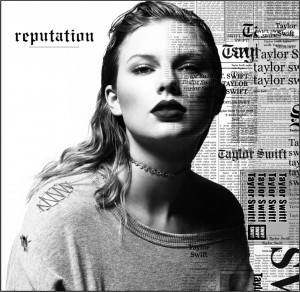Swift’s ‘reputation’ breaks new ground

While the old Taylor may be dead, it just so happens that the new Taylor can twist words into lyrics as artistically as her former self.
Taylor Swift’s new record, “reputation” is cohesive, yet manages to stretch over a broad spectrum of radically different sounds and styles.
This proves her to be a true chameleon in the music industry with “reputation” sounding just like the Taylor fans have known and loved, yet nothing that they have ever heard from her before.
Her evolution as an artist showcases a woman who is intent on redefining herself and her music with every new album. Few, if any, artists have been able to cross from country to pop as seamlessly as Swift.
After her hit single “Look What You Made Me Do” focused on settling scores with a harsh tone, people were expecting an album to be dripping with celebrity feuds.
That couldn’t be more wrong.
Instead, “reputation” serves primarily as an expertly written love story, while dedicating only two songs to feuds.
The other feud song, “This Is Why We Can’t Have Nice Things” alludes to the “Gatsby” lifestyle, backstabbing foes, and odes to her “real friends,” her “baby” and of course, “her mama.”
“This Is Why We Can’t Have Nice Things” is not a hard hitting song with a tone of a scorned enemy as much as it is a bop worthy, funny, and entertaining song.
Songs like “…Ready For It” show off this synth heavy style that dips into new horizons resembling rap. Meanwhile, “Don’t Blame Me” has an almost choral sound to it with voice overlaps.
Both are incredibly different, yet they share the same smart lyrics people would expect from any Swift album.
“End Game” was highly anticipated when it was announced that it was a collaboration with Future and Ed Sheeran.
“I bury hatchets, but I keep maps of where I put them,” Swift harshly sings in the song that quite frankly blends into the background of the album. However it serves as another example of her jumping into the mainstream pop.
Swift’s sixth record also marks the first time she experiments with lyrics about sex and drinking. Lots of drinking.
Songs such as “Dress” and “… So It Goes” are prime examples of this. Never before has the lyric, “I only bought this dress so you could take it off,” appeared on a Swift album.
Songs like these showcase the 27-year-old singer who has outgrown her reputation as America’s Sweetheart.
“Delicate,” a song that follows the confusing beginnings of a relationship, is one that brings a calmer sound. “Is it cool that I said all that / is it chill that you’re in my head / ‘cause I know that it’s delicate,” Swift sings.
Another interesting song, “Getaway Car,” follows a story of Swift leaving one man for another, despite realizing that the relationship is doomed because “nothing good starts in a getaway car.”
This song can show off Swift’s country writing roots with a sound that is the complete opposite of that genre.
“Call It What You Want” is another standout song that has all the hallmarks of a typical Swift hit. Loaded with imagery, this story follows a seemingly broken and beaten Swift living a quiet and happy life with a new love.
Its mellowed track stands out among the rest of the album as it is a calming song differing from the rest of the hard hitting bombastic songs previous to it.
For those who miss the late Taylor Swift, (rest in peace) it seems that she had time for one more song before passing. “New Year’s Day,” the very last song on the record, is the only acoustic song, and it is perhaps one of her better love songs to date.
Fans seem to love “reputation” as evident by the sales. It is the bestselling album of the year, and Swift is the first artist to have four consecutive albums selling over one million copies during the first week.
Overall, “reputation” stands among the best of Swift. She has yet to choose between good lyrics and a good sound—“reputation” proves yet again that Swift is a star that can stand the test of time.









